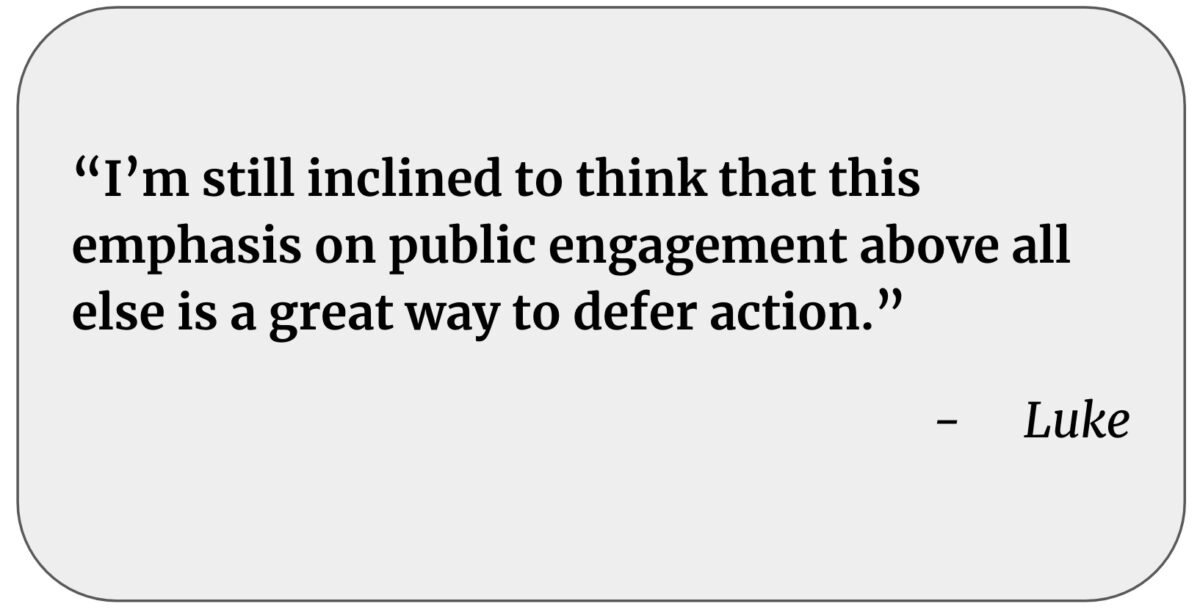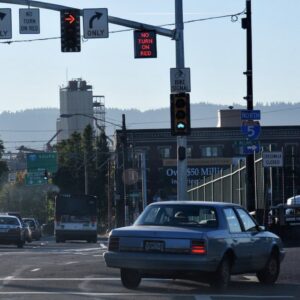Welcome to the Comment of the Week, where we highlight good comments in order to inspire more of them. You can help us choose our next one by replying with “comment of the week” to any comment you think deserves recognition. Please note: These selections are not endorsements.
Portland, the city where even public process has a public process.
Our article, PBOT advisory committee reform is underway, but participants have questions,
prompted a number of educated and informed comments.
A paragon of public process, from neighborhood associations to advisory committees to stakeholder committees to a class on training advocates (the PBOT/PSU transportation class), Portland puts Portlanders front and center.
But for what purpose?
That question came up early during a workshop last week on restructuring the city’s modal advisory committees: freight, bicycle and pedestrian. Judging from the feedback at the workshop, and from the quality of our comments on the topic, at the very least, one could say that Portland’s public processes produce a public very educated about transportation.
Luke’s comment expressed a thought that comes up regularly: They know what to do, why don’t they just do it? Because a lot of volunteer time goes into public participation, so many of us have put in the hours.
Here is what Luke wrote:
“I’m still inclined to think that this emphasis on public engagement above all else is, ultimately and most importantly for those who emphasize it, a great way to defer action. Think back to that (by now) infamous Streetsblog post from the consultant out of Boston going to Amsterdam and claiming Boston’s process was better because it “centered marginalized voices”…even though it’s much harder to get around Boston without a car than it is Amsterdam.
We already know what works for improving general mobility; all we need to do is look across the pond–at this point, either pond–to see it. Motorist voices’ need to be ignored, and those who claim that autocentric infrastructure and urban forms will work if we build them out enough are either ignorant or willfully lying.
Enough with the committees, the public outreach, the community surveys, the reform panels. Just stop building car-dependent suburban sprawl and stroads; stop widening highways. Build compact, walkable/bikeable/rollable towns and cities; nothing else will work without excluding the poor and the vulnerable, bankrupting us all, destroying the planet, and socially isolating us all.”
Luke’s comment can be found under the original post. Thank you Luke and everyone else for commenting.








Thanks for reading.
BikePortland has served this community with independent community journalism since 2005. We rely on subscriptions from readers like you to survive. Your financial support is vital in keeping this valuable resource alive and well.
Please subscribe today to strengthen and expand our work.
When ~50% of Portland is housing insecure according to HUD metrics how is the so-called free market supposed to build its way out of scarcity without destroying the equilibrium of profit maximization. Perhaps the free market (and regulatory capture) is a major cause of housing insecurity. And, perhaps, the best way to make cities accessible to the precariat is to expropriate housing from the “market”.
So, are you proposing to condemn all housing and turn over ownership to government agencies or collectives? Would there be any compensation for current owners? Would this be done on a city-wide, state-wide, or nation-wide basis?
Since there’s also job insecurity, your next step would seem to be nationalizing industry.
Expropriate means to transfer ownership — this can happen via multiple mechanisms. For example, eminent domain with some sort of fair market value payment is one mechanism. This approach has been used to create less speculative housing markets in Europe. A measure that calls for the eminent domain of 10% of Berlin’s housing stock was recently passed so there is still popular support for this mechanism.
Just checking, but I am sure Berlin is buying the rich people’s homes right? They wouldn’t act rationally and apply eminent domain to the most affordable homes, but risk the social justice backlash of that? Right? We wouldn’t advocate for that eminent domain, just the kind that would be moral hazard and have the value of all homes go up because the government (perennially cost conscious as they are) is now a buyer?
Absolutely. Publicly-owned social housing is a major, necessary component of the remaking of our cities to be more functional. The Faircloth amendment must go–and in must come experts from overseas governments to ensure we engage in this process efficiently. There’s nothing wrong and everything right with seeking help from others when you don’t know what you’re doing, which the U.S. government emphatically does not in either transportation planning or social housing construction.
Mixed-income mostly market-rate housing is not social housing. Social housing is housing that ensures everyone has a “right to the city”, not just the rich.
ODOT knows what to do. I wish they would stop messing around with trying to get public buy-in for their plans and just expand the highway through the Rose Quarter already.
They know what works.
Really… That must be why all ODOT controlled roads and highways are so safe and efficient. Oh, wait…
“Oh wait,” you realized you are missing Watt’s point? LOL.
No, I really didn’t.
I agree this comment is often correct.
On the other hand, I’ve seen many cases where it’s the opposite–the correct solution is clear, but it’s the public that knows what that is, not the project team. Because there was a chance for input–sometimes planned, but often forced by the public–the project is changed drastically for the better.
I’ve also been involved in several where public input was severely restricted, and the result was having tens or hundreds of thousands of dollars of construction torn out because it didn’t work, for the reasons the public was trying the tell the project team before it was built. In others, the project didn’t listen to public input, and the result was the projects were ordered by review bodies to make expensive redesigns (for the reasons the public tried to tell the projects). In a couple extreme cases, appeals boards ordered the projects torn out–massive wastes of money caused by projects restricting public input, and not knowing what was the right solution themselves.
Hear hear!
qqq and Watts above me bring a predictable counter (rightly so) – trusting the experts/professionals is all well and good so long as the experts/professionals are all well and good, but I think what that means is we need to define where public process is important and where it’s less helpful.
Coming from a software world, for example, we have customers all the time asking for various features. Usually these asks make no sense, because they (non-technical folks) are trying to imagine the technical solutions instead of just giving us the problem they’re trying to solve and letting engineers engineer a solution. I think people (not folks who frequent BikePortland, I’d imagine) too often forget that traffic planning is a technical field with lots of engineering that has a lot more to it than “Well, just put a stop sign there!”
Where this breaks down (and where I reckon I have it easier in the software world) is confused/contradictory “problems” to solve: “I want safe, accessible streets. But also constant available parking, no impediments to drive anywhere I want as quickly as a I want, and a big house with a big yard not too close to my neighbors, but close enough to work and cool city amenities and and and…”. I’d say engineers need to be more honest with their bosses about what can and can’t be done, their bosses more honest to the elected officials, and the elected officials more honest with their constituents.
…of course, that all breaks down with a constituent populace easily swayed by charlatans with promises that “yes of course, you can have all of that, so vote in me and not this person telling you no”, so my idealized version of things is not incentivized and therefore doesn’t happen. Also requires the engineers not to be ideological, which I’m not convinced is the case. tl;dr: Forces of entropy win again.
You nailed it. You can leave solutions to experts when experts engineer the RIGHT solutions. As Hitler showed, you can engineer systems very skillfully to have the worst results.